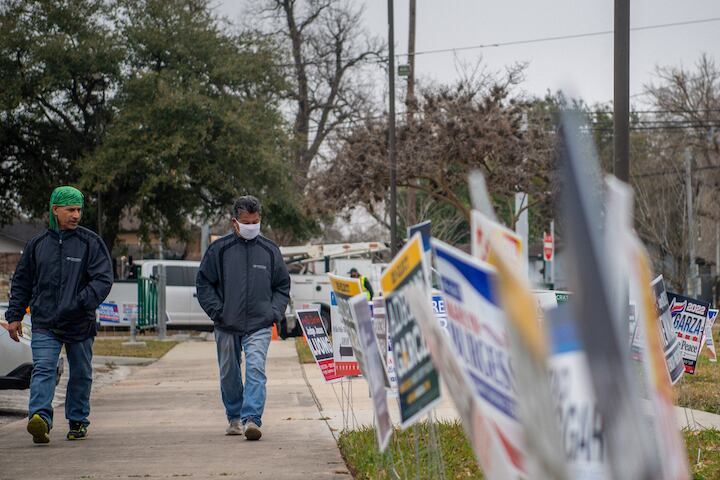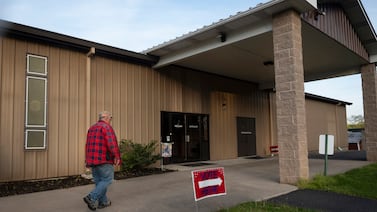A version of this post was originally distributed in Votebeat’s weekly newsletter. Sign up here.
We’re going to take a break from our series of newsletters about ERIC — the Electronic Registration Information Center — to take a very local look at the first primary of 2022, in my home state of Texas.
Perhaps the theme of this newsletter is “when things change, things also slow down.” It has ever been thus in elections, and it was thus in Harris County last week, as Texas’s largest county faced delays in reporting unofficial vote totals to the state. Why? Well, a lot of reasons. The county recently transformed the way it manages elections, brought on an inexperienced elections administrator, purchased brand new voting machines, and also had to respond to a big shift in state law. That’s a lot.
Harris County Elections Administrator Isabel Longoria is the first person with her title in the county. In 2020, the county Commissioner’s Court created the independent office, moving voter registration duties from the tax assessor’s office (really) and moving election management duties from the county clerk. Texas’s other major counties use a similar system, and Harris County was the outlier using its split system.
But unlike other counties, Harris did not install a seasoned election administrator to the role. Isabel Longoria was previously a voting rights adviser for the county, a role that did not come with specific election management responsibilities. While she has an extensive policy background, those who hold the same job in Dallas, Tarrant, Bexar, and El Paso counties have significantly more experience in managing elections, which are logistical marvels that require a steady hand.
The county began searching for new voting machines well before Longoria took office, and even before the office was created. The primary put the relatively new technology to the full test, leading to delays in tabulation across the county as many poll workers and voters figured out how to use the machines and did so for the first time. Human error abounded. Harris County’s ballots are also quite a bit longer than the rest of the state, which leads to natural delays in both casting and counting the ballots. Both pages of the two-page ballot needed to be fed into the scanners, which led in part to paper jams and delays in repair.
All of this on top of existing frustrations from voters and the county government with the new election law. More than 11,000 ballots ballots in the county have been marked for rejection largely because of the state’s new ID requirements, ballots that poll workers are still working to help voters correct.
So, all that to say, when Harris County missed the state’s deadline at 7 p.m. Wednesday for reporting early and Election Day results, it wasn’t entirely a surprise. And we should anticipate consequences in Harris County. The GOP there has wasted no time calling for Longoria’s resignation, pointing out her lack of experience. “Today we’ve seen what happens when you put the wrong person in the job,” county Republican Party Chair Cindy Siegel said at a press conference.
[Update, Tuesday, March 8: Longoria has announced she will resign in July.]
This isn’t entirely a partisan concern. Democratic county officials, like County Judge Lina Hidalgo, aren’t coming to Longoria’s full defense. “State leadership lost their moral authority on elections the day they bought into the Big Lie and used it as the basis to pass SB1,” Hidalgo said in a statement. “Still, that does not absolve our own elections administrator from being expected to run a smooth and efficient election for our voters. I am eager to get a full accounting from the elections department, including any state, local, and party-level issues.”
Back Then
In 1920, after women had been granted suffrage through the 19th Amendment, Texas attempted to stifle the voices of women by enforcing a poll tax and offering super inconvenient means for the collection of the tax. By the end of the payment period offered that year, only 1,000 women in Harris County had paid it. No matter, because lawyer, activist, and all-around badass Hortense Sparks Ward sued the county, saying the tax was in violation of the newly passed 19th Amendment. The court ruled in her favor, making Harris County the only county in the state where women could vote regardless of whether they’d paid the tax.
In Other Voting News
- Former Wisconsin Supreme Court justice Michael Gableman released a draft report about his investigation into the state’s 2020 election. In it, he embraces disproven conspiracy theories and even recommends decertifying the election — something Trump has called for and which legal experts agree is not possible.
- Congress’s Jan. 6 Commission has alleged that President Trump knew very well he’d lost the election, and decided to hold onto power anyhow, accusing him of committing a fraud on the American people. It is the latest sign they may hold out for criminal charges against the former president or his associates.
- The Washington Post is out with a doozy on Roger Stone, who apparently let a documentary crew film him for hundreds of hours during all of that stuff that happened after the election. Among the revelations from the tape: Stone communicated personally with members of far-right extremist groups, many of whom have pleaded guilty to various offenses on Jan. 6; he was personally involved in mounting Trump’s effort to retain power, despite his attempts to distance himself from the movement; and he wanted pardons for himself and other people who would likely face charges for attempting to overturn the results of a valid election.
- Things are still strange in Colorado, where fringe right-wing groups are attempting to convince local clerks to give them secure voter data and security information. Tina Peters, the embattled Mesa County clerk now running for secretary of state, is very involved.
- The North Carolina Supreme Court has agreed to hear arguments in a photo voter ID lawsuit without waiting for the Court of Appeals to consider it first. The request to expedite the hearing came from plaintiffs representing minority voters, who successfully halted the implementation of the state’s voter ID law in 2018, convincing an appeals court that the law would have harmed Black voters. Republican leaders appealed the ruling. Arguments are expected this summer.
Good News of the Week
State lawmakers in Oregon have passed a bill allowing election workers to keep their addresses private and also upping penalties for harassing election workers. The bill now heads to the governor’s desk, who is expected to sign it.
“False information threatens Oregonians’ trust in our elections and has created an environment that poses real-world risks to elections workers in Oregon,” said Oregon Secretary of State Shemia Fagan in a Thursday statement. “In the months leading up to and since the 2020 election, election workers across the country have faced verbal abuse, harassment and violent threats on their lives.”





